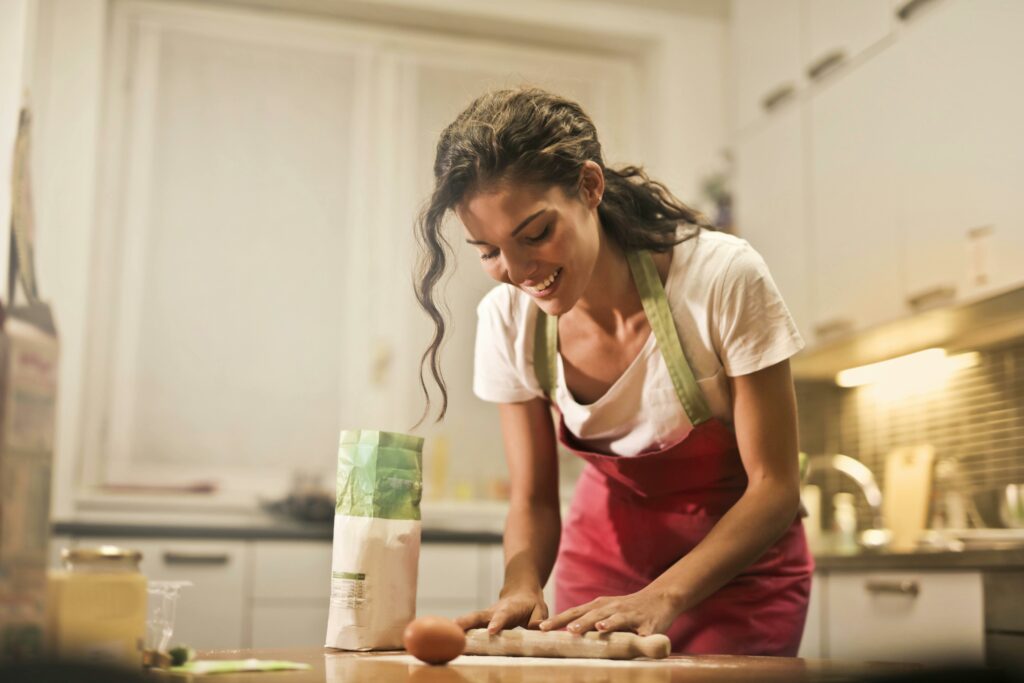Does glamourising traditional gender roles undermine women’s rights?
The #tradwife movement has sparked heated debates within feminism circles. Considering themselves to be ‘traditional wives’, the trend romanticizes the occupation of a traditional homemaker and champions traditional gender roles, which appoint “men as breadwinners and women as breadmakers”. It is often associated with a rejection of modern feminism and an embrace of more traditional religious values.
Through TikTok and Reels, these women have built successful followings around highly choreographed performances of domesticity. Sharing videos and advice on topics such as cooking, cleaning and parenting. If you haven’t seen them yet, scroll with caution, these women’s perfect on-screen lives might look different off-camera.
While they may not work in a traditional sense, by producing content, raising sponsorships and marketing themselves, Tradwife influencers are working hard and building streams of income that are entirely independent from their male partners.
Yet this labour is not recognised nor seen, instead it is belittled. The value of domestic labour has been systemically diminished in the public consciousness (whether by purpose or not) by its lack of economic recognition. With movements focused on achievement (I.e. ‘Girl Boss’) being more celebrated or socially acceptable we seem to be equating self-worth via economic productivity. In consequence forms of unpaid labour such as homemaking are ‘un-seen’.
Taking a step back to the origins of the movement, we see some of the original Tradwives didn’t intend this. The opposite is argued, Tradwives elevate the value of domestic work as essential for family well-being, and show it as a source of pride and happiness. They challenge the notion that professional success is the only path to fulfillment.
Alena Kate Pettitt, who made news in 2020 as a ‘curious individual’ who chooses to take care of her family over having a ‘career’ shares, “it’s not about what you look like, it’s about your lifestyle and how you are happiest and how you serve your family.”
Another acclaimed ‘traditional wife’ Ebony Mackey explains, “being a tradwife is a feminism to me, it’s a woman’s choice and its very powerful to maintain a
home.”
Ignoring the 1950’s makeup, floral gowns and dainty aprons. Ignoring the fact that these videos are glamourised. Perhaps it doesn’t come as a surprise that the women of TikTok are spending their time publicly expressing their desire for a simpler lifestyle.
Perhaps the broader question to ask is, why, as a society, don’t we value this lifestyle? and why do
we measure worth by economic output?’
When young women are feeling the pressure of modern work as exhausting, unstable and unfulfilling, you can see why one might wish to fantasise.
Unfortunately, this is where the global danger of the #tradwife trend comes in. These seemingly innocent videos romanticise a fake past, of which they’ve never experienced, inadvertently reinforcing existing gender inequalities, providing propaganda and/or political fuel and risking hard-fought progress for women aynd girls.
It nourishes society’s dimmest, most damaging ideas about women as ‘submissive’. The association with such content, whether by accident or design is hard to escape.
While the movement stirs controversy, let’s be clear: there’s nothing wrong with wanting to spend more time with your family or less time at work — or even opting out of the latter entirely in order to focus on the former. There’s also a difference between mums who stay at home and work with their partner to find balance and equality within their relationship and tradwife influencers who turn their stay-at-home lifestyle into a small industry but hide that industry from followers.
It reminds us that feminism isn’t one-size-fits-all, we can celebrate diverse choices, empower ALL women, and appreciate the multifaceted roles they play.
ABOUT THE AUTHOR
Ellie Barclay is the magnificent mind behind the CBR Gals Teacher Tuesdays segment and is a regular contributor to our blog.

